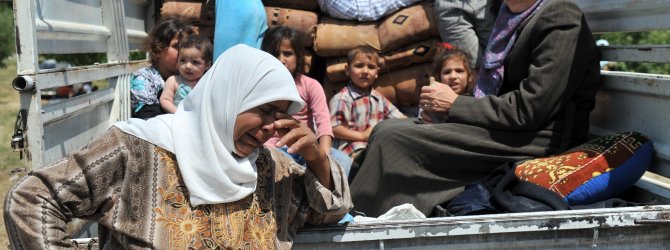-
Innovation in Humanitarianism Is Necessary, but It Will ...
Innovation in Humanitarianism Is Necessary, but It Will Not Bring Peace

Tomorrow, August 19th, is World Humanitarian Day. There will be an abundance of articles about it, but few of them will discuss what it really means to be humanitarian. The most important aspect of being a humanitarian is to end wars and to work to sustain peace. It is not about summits and conferences. In May this year, world leaders did not seem to get this point, when Istanbul played host to the first ever World Humanitarian Summit (WHS).
The purpose of the WHS – innovation in humanitarianism – was good, but the participation of states that subsequently wage war brought an unholy double standard to the summit, which arguably impaired its legitimacy. Before anyone can persuasively claim to be humanitarian, they need to decide and commit to sustain peace – not only in principle, but in action.
In the meantime, of course, innovation in humanitarianism is necessary, because the 60 million displaced persons, the 795 million hungry persons, and the one billion thirsty persons will not go away in a handshake. We need new solutions to ameliorate these people’s unmet needs and grant them their basic rights of life, which – when met – also decreases the risk of conflict. Thus, even if the prerequisite that states commit to long-term peace is not met, innovation in humanitarianism certainly helps.
One of the humanitarian innovations with the greatest potential is actually over a thousand years old. Every year, somewhere between USD200 billion and USD1 trillion is spent on zakat, placing it within the top ten donors and up to 15 times higher than global humanitarian aid contributions. It is well within the purview of the Qur’an to spend zakat on the needs of refugees, on those affected by war or natural disasters, or even to organisations that administer zakat. Exploring how zakat can be used for humanitarian and development purposes, and then instituting a coherent and accountable regional structure to collect and disperse zakat, could be the most exciting innovation in humanitarianism to date.
Here in Jordan, another very clever innovation is already operational. The usage of biometrics to register and verify the identity of refugees is pioneering and ready to be deployed globally. A refugee in Jordan can now get their iris scanned at ATMs to get their cash support with no debit card and consequently at a very low overhead cost. It is effective for everyone involved, and allows the UNHCR to spend the money it saves on people who need it instead of administration. This example also shows how innovation in humanitarianism can drive the development of new technology for general public use, beyond humanitarian relief.
A third area that could inject innovation into humanitarianism is the private sector. CSR is often about leaving a longer-term impact, such as building schools, wells, or hospitals, funding vaccination programs, or donating products to less well-off people. If we manage to find innovative solutions and partnerships in cooperation with the private sector, we can construct a win-win situation to bring people out of humanitarian crises and poverty traps for good.
Notwithstanding this, however astute humanitarian solutions are, and whichever innovations are put forth and implemented, they will not end the wars that created the need for humanitarian intervention in the first place. The purpose of humanitarian relief should be to respond to an unforeseen and unavoidable catastrophe or natural disaster. War is a condition that causes tremendous human suffering, loss of life and livelihood, is economically irrational, but also could have been avoided. There is nothing inevitable about war, and we should all be ashamed of our collective failure when humanitarian relief has to be deployed in response to war.
The epitome of irony is that instead of ending wars, conflicts are themselves being humanitarianised, and it is about time we answer honestly why that is the case and how constructive it actually is. The 12 million displaced Syrians – both refugees and internally displaced – make for an instructive example. While a consequence of the conflict, the emphasis now seems to be on how to deal with refugees, rather than how to bring peace and sustain it – as if the two were mutually exclusive. The result is protracted human suffering, only to maintain an international systemic status quo on the Syria conflict.
I think we need to start by analysing the obstacles to peace as opposed to the causes of conflict. A key to such obstacles is the lack of an international structure that has the capacity, capability and a ubiquitously recognised mandate to force, negotiate and sustain peace. The collected international community needs to show resolve and engage with fortitude in this matter.
Indeed, rethinking humanitarianism and how we can better respond to humanitarian crises is inherently good and necessary – and the achievements so far by innovative humanitarian agencies and private sector actors are truly admirable. However, we must at the same time summon the courage to hold states accountable for their actions. Any gain in the humanitarian domain will otherwise be temporary, at best.
Humanitarianism is not only for relief agencies; it is the ideology that states must work towards a better future for humanity built on principles of dignity and mutual respect. I hope the international community of states can honour the covenants they have entered into and the conventions they have ratified, and hence be true to their words. We deserve better than recurring wars; people deserve a life in sustained peace.

